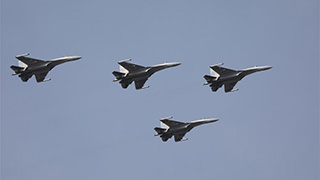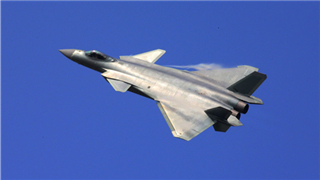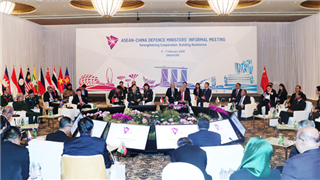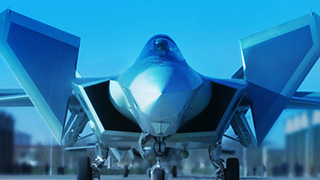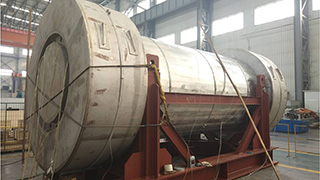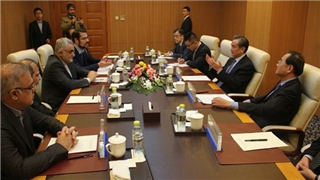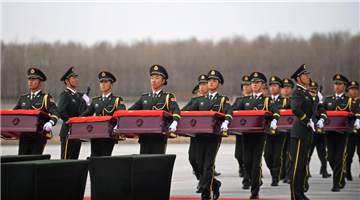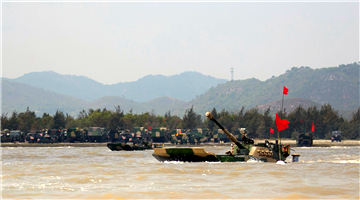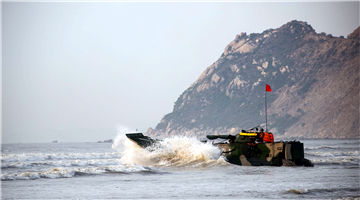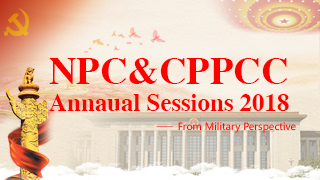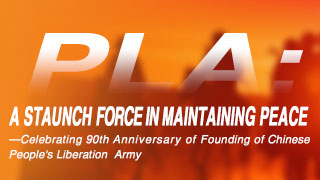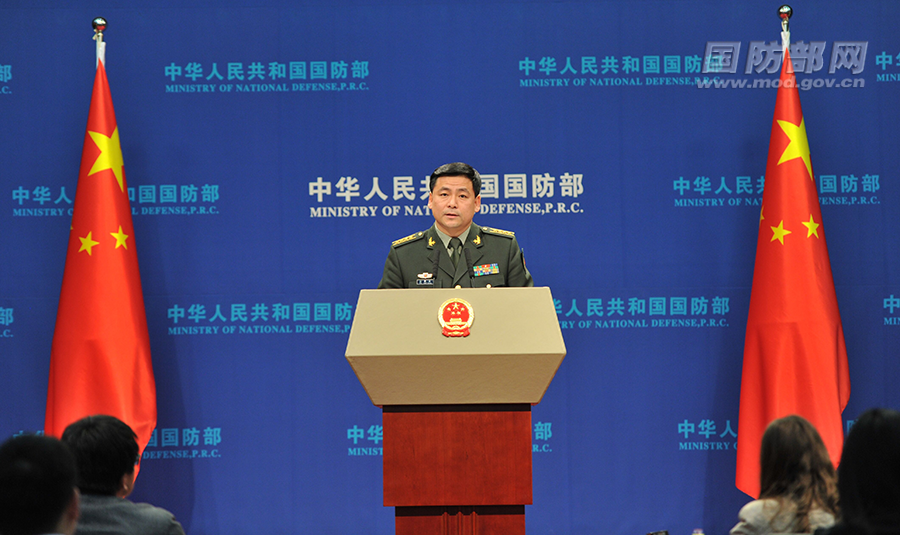
(The following English text of the press conference is for reference. In case of any divergence of interpretation, the Chinese text shall prevail.)
Senior Colonel Ren Guoqiang: Friends from the press, good afternoon! Welcome to this month’s regular press conference of the Ministry of National Defense (MND) of the People’s Republic of China (PRC).
I’d like to start today’s regular conference with an announcement.
At the invitation of Russian Defense Minister General Sergei Shoigu and Belarusian Defense Minister Lieutenant General Andrei Alekseyevich Ravkov, Chinese State Councilor and Defense Minister General Wei Fenghe will attend the 7th Moscow Conference on International Security in Russia, and pay a visit to Russia and Belarus from April 1st to 8th, 2018.
During the visit, General Wei Fenghe will meet with Russian and Belarusian state and military leaders, and exchange views with them on further developing bilateral relations, deepening practical cooperation in military field and regional and international situation. This visit will further enhance the defense and military relations between China and the above countries.
Now the floor is open for questions.
Question: Why has general Wei Fenghe chosen Russia as the destination of his first visit after he assumed the position of Defense Minister? What are the underlying considerations?
Answer: China and Russia are each other’s primary and most important strategic partner of coordination. China-Russia relationship is the best major-country relationship in today’s world. This relationship is as firm as a rock. In recent years, with the personal care of President Xi and President Putin, the state-to-state and mil-to-mil relations between the two countries have been developing at a high level with ever-deepening cooperation and mutual trust.
The visit is a specific measure to implement the important consensus reached by the two heads of state on developing mil-to-mil relationship. This visit will help deepen practical cooperation between the two militaries, and enrich the comprehensive and strategic partnership of cooperation between the two countries. China is willing to work with Russia, jointly push forward the mil-to-mil relationship, and make active contribution to safeguard common interests and maintain regional and world peace and stability.
Question: The 1st Sessions of the 13th National People’s Congress (NPC) and the 13th Chinese People’s Political Consultative Conference (CPPCC) have concluded not long ago. During the two sessions, President Xi made important remarks, instructing on the vital deployment on defense and military development. Has the military made specific plans to implement the instructions ?
Answer: Approved by the Central Military Commission (CMC), the CMC General Office has released a notice recently, asking the military to earnestly study the spirit of the 1st Session of the 13th NPC, particularly, the important remarks made by President Xi at the plenary meeting of the PLA and the Armed Police delegation to the 13th NPC and President Xi’s important remarks at the closing ceremony of the NPC. The notice also asks the military to have unified thinking, action and pace to enhance the consciousness of politics, the idea of overall situation, the consciousness of upholding the CPC leadership as the core and keeping alignment; and to firmly maintain the authority of the CPC Central Committee, the core and the CMC Chairman responsibility system. It asks the military to closely unite around the CPC Central Committee with Comrade Xi Jinping at its core, to draw a new chapter of our course of building a strong country and a strong military in a new era.
Relevant issues have got wide media coverage by China’s official media.
Question: A decision was made to set up the Department of Veteran Affairs at the first session of the 13rd National People’s Congress. Some of the functions originally belonged to the Political Work Department and the Logistic Support Department of the CMC are now integrated into the newly established Department. Will there be adjustment and changes in the Chinese military’s roles in protecting the legitimate rights and interests of military personnel and their families and strengthening the service and support system for veterans afterwards?
Answer: To set up the Department of Veteran Affairs is an important step to implement the decision of the 19th National Party Congress on establishing a management and support institution for veterans, and an important decision made under the background that the State Council is streamlining and restructuring its institutions. The establishment of the department is to maintain the legitimate rights and interests of the military personnel and their families, strengthen the building of the service and support system for veterans, build and optimize a concentrated, integrated, and well-defined service and support system for veterans, so as to make the military a better respected career in China.
The setup of the new department fully demonstrates the love and care of the Central Party Committee, President Xi and all the Chinese people towards Chinese military officers and soldiers, veterans and their families. All the officers and soldiers of the Chinese military are greatly encouraged.
Veterans are the treasured asset of the Party and the country. They are the witnesses, pioneers and builders of the new era. They came from the people and served the people. Now they return to the people and repay the people. They will not wear the military uniform anymore. Yet they remain the most lovable people. They will forever be our dear and honorable comrade-in-arms. I would like to show you a short video clip we prepared named “veterans”.
As what was said in the end of the video, the roles of veterans might be different at different stages of their lives, but their devotion to serve the people remain consistent. Hereby please allow me to give my thanks and tribute all veterans.
Question: Recently, it seems that the US Navy has been pacing up the Freedom of Navigation Operations near the Chinese islands and reefs in the South China Sea. The latest operations happened on the very next day of the signing of the memorandum that could impose tariffs on up to 60 billion US dollars of imports from China by the US president. How do you comment on the current mil-to-mil relations between China and the US?
Answer: To develop a sound and stable mil-to-mil relationship between China and the US is an important consensus that the leaders of both countries reached, the common interests of the two countries and militaries and the common expectation of the international community. The Chinese military has always attached great importance to the development of the military relations with the US. At the same time, the PLA is committed to firmly safeguarding national sovereignty, security and development interests. Both history and the reality have proved that to develop the China-US mil-to-mil relations, we should consider not only each other’s immediate interests but also our common interests in the long run. We should not only resort to practical steps to address specific issues, but also a broad vision to put in mind a bigger picture. And we should not only be aware of the potential risks and dangers ahead when things go smoothly, but also be able to see the light of hope when we find ourselves in difficulties. As the Chinese saying goes, if you see far enough, you may not find violent waves violent; if you rise high enough, you may not find stormy things stormy. This is why we hope that the US side will work with us in the same direction, jointly follow the overall trend of the state-to-state and mil-to-mil relations, and endeavor to build bilateral mil-to-mil relationship a stabilizing factor of China-US relations.
Question: During the first session of the 13th People’s National Congress, President Xi talked about the strategy of civil-military integration again in his remarks to the plenary session of the PLA and PAPF delegation. What have been achieved in the strategy of civil-military integration in recent years? What are the priorities in future? My second question is about the naval exercise in the South China Sea. We have seen from foreign media some pictures of more than 40 naval vessels including the Liaoning Aircraft Carrier assembled in the South China Sea. Could you please confirm whether the Liaoning Aircraft Carrier has participated in the exercise?
Answer: On your first question: since the 18th Party Congress, under the personal efforts make by President Xi in designing, leading and encouraging, the strategy of civil-military integrated development proceeds to its full implementation. The organizational structure has basically taken shape, overall strategic guidance, planning and coordination have been greatly strengthened, reform in key areas has steadily press ahead, priority projects have been gradually put into practice and relevant legislation programs have been pacing up. The development of civil-military integration is deepening and enhancing at all levels and in all areas, demonstrating a good momentum of integrated and accelerated development.
To further deepen civil-military integration at the new historic starting point, it is imperative for us to act in the spirit of the 19th National Party Congress in an all-round way, fully understand and implement the Xi Jinping thought on socialism with Chinese Characteristics in the new era, uphold the Xi Jinping thought on building a strong military and his strategic thinking on civil-military integrated development, take the building of an integrated national strategies and capabilities as the goal, take problem-oriented approaches, focus on the priorities of strategic importance, and make efforts in the following four aspects:
The first is to enhance strategic guidance. It is imperative for us to grasp the strategic positioning and the general requirement of civil-military integrated development, build a concept of openness and sharing, and better integrate military development into national economic and social development.
The second is to promote reform and innovation. We are bound to improve the systems and mechanisms of civil-military integration, solve the problems lying in the current policies, systems and mechanisms, remove the barriers for easy access, and allow the furthest release of the endogenous force of civil-military integration.
The third is to enhance civil-military coordination. We shall look into and solve the problems on aligning needs, coordinating and sharing important resources, and developing a coordinated system of innovation, so as to enhance the scope of civil-military coordination from what can and should be integrated to a deeper and wider extent.
The fourth is to strengthen implementation. We shall take the national demonstration zones of innovation and priority projects in civil-military integration as the lead, the area, such as infrastructure, armament and equipment, defense technology, personnel training, logistic support and defense mobilization, and the emerging domains, such as oceans, airspace, cyberspace, bio-technology and new energy, as priorities, and push forward the implementation of the key tasks and projects of civil-military integration.
On your second question: the live-force naval exercise conducted by the PLA Navy in the South China Sea is the measure to implement the important instruction of President Xi at the opening ceremony of the new year training session of the PLA and encourage the combat-oriented training of the PLA naval troops. It is a routine arrangement in accordance with the annual training program of the PLA Navy. The purpose of the training is to test and enhance the training level of the Navy, and promote the capabilities of the troops to win wars. It is not targeted at any specific country or target.
As for the Liaoning Aircraft Carrier, the Navy will release relevant information in due time.
Question: Recently, the reform plan of various forces in the People’s Armed Police Force has been announced. The Border Defense Force, Fire-fighting Force and the Security Force will leave the PAPF and thus decommissioned. The Maritime Police troops led by the China Coast Guard will be transferred to the PAPF. What is the consideration for such reform? What do have to arrange those decommissioned officers, non-commissioned officers and soldiers?
Answer: To deepen the reform of the People’s Armed Police Force (PAPF) is a strategic measure to fully implement the absolute leadership of the Party over China’s armed forces and to build a modernized armed police force. According to the decision by the Central Party Committee, from January 1st, 2018, the Armed Police Force is put under the unified and centralized leadership of the Party Central Committee and the Central Military Commission (CMC), and adopt a CMC-PAPF-troops leadership and command system.
At present, the adjustment and reform of the PAPF’s internal security corps, mobile corps, colleges, scientific research institutions and training facilities have been basically completed.
The Plan on Deepening Reform of the Party and State institutions issued recently by the CPC has made decisions on the handover and reorganization of the gold, forest and water and electricity guarding forces of the PAPF, the transfer of the maritime police troops to the PAPF, and the restructuring of the Border Defense Force, Fire-fighting Force and the Security Force. Next, the Chinese military will work together with relevant departments of the Central Party Committee and governmental agencies to fulfill the reform tasks related to both civil and military sectors.
Question: After Donald Trump signed the Taiwan Travel Act, Taiwan's Kaohsiung Mayor Chen Ju visited the US and Alex Wong, deputy assistant secretary in the Bureau of East Asian and Pacific Affairs at the US Department of State visited Taiwan. The Taiwanese authorities were thrilled for the visits. How do you comment on the so-called “exchange”? At the same time, we noticed that the Liaoning aircraft carrier sailed across the Taiwan Strait after the Taiwan Travel Act was signed. There is a loud voice in the Taiwanese media saying that a storm is coming. Do you have any comment on that?
Answer: We firmly oppose any forms of official exchanges or military contact carried out by any country, including the US, with Taiwan. Taiwan is an inseparable part of China. No one, no force, nor any actions can stop China from realizing its complete reunification and national rejuvenation. The Chinese military has the firm determination, full confidence and sufficient capability to safeguard national sovereignty and territorial integrity.
Question: According to media report, China and Cambodia conducted a “Gold Dragon 2018” joint training exercise in Cambodia, with almost 500 troops from the two countries participating in the training. Could you please give us more details of this joint training exercise?
Answer: The “Gold Dragon 2018” joint training exercise , themed joint counter terrorism and humanitarian relief, started on March 17. This exercise constitutes a practical measure implementing the important consensus on strengthening practical military cooperation reached by the leaderships of the two countries and the two militaries. This exercise coincides with the 60th anniversary of the establishment of diplomatic relations between China and Cambodia. Both sides paid high attention to the exercise, and conducted close communication and cooperation on the planning and organization of the joint training exercise.
Compared to the “Gold Dragon 2016” joint training exercise, this year’s joint training exercise was expanded to the anti-terrorism field. There were four main features:
First, the scale of participating troops was larger. There were 496 troops from China and Cambodia forming a mixed formation to conduct the joint training exercise.
Second, the joint training exercise was more combat-oriented. There were four subjects including counter-terrorism tactical training and humanitarian relief.
Third, the equipment was more diversified. Infantry fighting vehicles, rotor unmanned aerial vehicles, transport helicopters and other equipment were employed in the joint training exercise.
Forth, the way of force projection was multi-dimensional. Railway transportation, maritime transportation and air transportation were all employed. The helicopter detachment conducted long-distance and cross-border delivery.
During the joint training exercise, the Chinese troops also provided free medical treatment to local residents and donated 194,000 pieces of aid materials including food, medicine and school supplies.
Both sides expressed satisfaction with the results of the joint training exercise. The Chinese military attaches great importance to developing friendly cooperative relations with the Cambodian military, and is willing to work with Cambodian side to deepen practical cooperation and contribute to regional peace and stability.
【Photo caption: Photo one: The opening ceremony of the “Gold Dragon 2018” joint training exercise. Photo two: Troops from China and Cambodia conduct counter-terrorism tactical training. Photo three: Troops from China and Cambodia conduct exchanges on skills of light and small arms. Photo four: Troops from China and Cambodia conduct counter-terrorism tactical training in mixed formation. Photo five: Training on detection of toxic agents.】
Question: We learned from online blogs that the establishment of the Ministry of Veterans Affairs would be a great bonus to all the veterans, but there were also worries about whether the department, without the leadership of the military and without personnel of military background, would truly be able to address the concerns of the veterans. Would you please tell us whether there will be some military personnel in the department? What security measures will be taken? We noted that the Maritime Police Troops had become a part of the Armed Police Force in this round of reform. Foreign media speculate that the reform of the maritime police is the copycat of the U.S. Coast Guards. It is set up to counter Japanese Self-Defense Forces. What is your comment on that?
Answer: The information on the candidates for the leadership of this newly-established Ministry of Veterans Affairs will be released in due course. As to the integration of the Maritime Police Troops into the structure of the Armed Police Force, relevant work is pressing ahead smoothly according to the Plan on Deepening Reform of Party and State Institutions. Here, I would like to stress that we have the capability, the confidence and the determination to safeguard our national sovereignty, security and territorial integrity after the reform.
Question: The PLA Air Force has sent an airplane to the Republic of Korea to take back the remains of 20 Chinese People's Volunteers (CPV) soldiers who were killed in action, and also the Ministry of Civil Affairs has made a decision that publicity and educational theme activities should be held nationwide in commemoration of heroes and martyrs during this year’s Tomb Sweeping Festival. Do you have any comments on that? The second question is about the RIMPAC-2018. Has China received the invitation to participate in the exercise? Will China participate in the exercise or not?
Answer: We will always remember and commemorate our fallen heroes who have sacrificed their lives for the peace and progress of humanity and they will always have our hearts with them. As for the specifics of the returning of the CPV soldiers’ remains, I suggest you refer to the Ministry of Civil Affairs which is in charge of the work. As for the second question on the RIMPACT exercise, we have received the invitation from the U.S. side. In early April, we will send a working group to participate in the final planning conference of the RIMPAC exercise.
Question: Will there be any change in the function and mission of the Maritime Police Troops after it is integrated into the Armed Police Force? It is reported that the Japanese side is highly concerned about whether China’s Maritime Police Troops conducting law enforcement activities currently in the disputed waters between China and Japan in the East China Sea will be put under the command of the CMC. How do you comment on it?
Answer: The CMC exercises leadership and command over all the armed forces in China. The Chinese People’s Armed Police Force is an important component of the country’s armed forces. We want to emphasize that the Diaoyu Dao and its affiliated islands have been China's inherent territory since ancient times. The Chinese side will resolutely safeguard its territorial sovereignty and maritime rights and interests.
Question: Recently, a 27-year-old man surnamed Wang was detained by the Nanjing police for spreading extreme remarks regarding the Nanjing Massacre online. There is a saying that the lack of the defense education leads to this phenomenon of spiritual Japanese. During the “Two Sessions” when Premier Li Keqiang delivered the report of the government work, he said that it was necessary enhance defense education of the whole people. I wonder if there is any specific measure to implement that decision.
Answer: The Chinese people has always had the fine tradition of patriotism and the respect for the military. To join the military and to contribute to the defense of our nation is the mainstream opinion. However, there are certain individuals who are ungrateful and who will do anything to get attention. So in this new era, it is indeed necessary to enhance defense education, to speed up and to deepen reform on defense education and to start to amend the National Defense Education Law as well as the guidelines on national defense education. We will also have the advocacy program across the whole society to carry on education activities so as to build a social atmosphere in which heroes and military are respected and supported. Our defense is the people’s defense, and our military is the people’s military. Hence it is necessary for the military to uphold the principle of the people, to uphold the people’s position and to stay people-oriented. At the same time, we also hope that people across the whole society can continue to be care about defense, to love defense, and to support and build defense so that we can all work together and stay united to unite our whole forces for the realization of the Chinese dream and the dream of building a strong military.
Question: It is said that the Indian Defense Minister Nirmala Sitharaman is likely to visit China recently, and she will participate in the Shanghai Cooperation Organization (SCO) Defense Ministers’ meeting. Could you please provide some specific information? And when will the SCO Defense Ministers’ meeting be held?
Answer: The mil-to-mil relationship between China and India is an important part of the state-to-state relationship of the two nations. China is willing to work with India to implement the important consensus reached by the two heads of state, accumulate strategic mutual trust, promote mutually-beneficial cooperation and ensure the normal development of the relationship between the two militaries. The specific exchange programs between the two militaries are currently under consultation and we will release information in due course.
Question: It is reported that the defense establishments of China and Japan are expected to sign the agreement on the launching of the Maritime and Air Liaison Mechanism during the meeting between the heads of state this May. Could you please brief us on this? And what is the progress in the defense relationship between the two countries?
Answer: Talks and consultations on this mechanism have achieved important and positive progress. We hope that Japan can remove the obstacles, work in the same direction with China so that we can jointly launch and operate this mechanism as soon as possible. China attaches great importance to the defense relationship with Japan and as the state-to-state relationship is showing signs of improvement, we are willing to work together with Japan, taking the 40 anniversary of treaty on peace and friendship as an opportunity, to enhance coordination and communication and manage differences and disputes to promote exchanges and cooperation in a healthy and steady manner.
Question: Admiral Harris, Commander of the U.S. Pacific Command, recently made a comment that he thought the U.S. should continue to sell arms to Taiwan on a regular basis. What is your comment on that? Japan’s Liberal Democratic Party put forward at a meeting on national security investigation on March 20 that Japan should upgrade the Izumo helicopter destroyer into an aircraft carrier and introduce the F-35B stealth fighter jets. What is your comment on that?
Answer: China is firmly opposed to any arms sale to Taiwan by any country. We urge the U.S. to observe the one-China principle as well as the Three Joint Communiqués between China and the U.S., and stop promoting its arms sales to Taiwan. The PLA is in combat readiness and on high alert to safeguard China’s unification, national sovereignty, security and territorial integrity. Any attempt to resist unification through military means is doomed to failure. As for the second question, because of historical and realistic reasons, Japan’s movements in military and security areas have always been under close attention of its Asian neighbors and the international community, especially Japan’s development of offensive weapons beyond its purely defensive defense demands. It is worthy of keeping much more alert of this movement of Japan. We urge the Japanese side to take history as a mirror, do more things conducive to enhancing mutual trust with its neighboring countries, and regional peace and stability.
Question: Last year, China and Pakistan conducted many high-level military exchanges and exercises, including the joint training between the air forces of the two countries. Will there be such high-level military exchanges and will there be other joint exercises and training this year?
Answer: China and Pakistan share an all-weather strategic cooperative partnership. The two sides have maintained a very high-level defense and military exchanges and cooperation. The military exchanges and cooperation programs between China and Pakistan this year are still being discussed. We believe that the China-Pakistan military exchanges and cooperation will surely facilitate our state-to-state relationship and also contribute to regional peace and stability.
Question: TheTiangong-1 space station will recently return to the earth. It is said that the space program has military background. I wonder if you can tell us when and where that might happen? It is said that the troops reduction of 300,000 personnel has been basically completed. Could you confirm that?
Answer: On your first question, please refer to the competent authorities of the state.
On your second question, the downsize of the military by 300,000 is a very important political decision as well as an important declaration made by the Party and the country. The deepened defense and military reform plan has made a very considerate arrangement on the downsize of the military. As the reform of military’s leadership and command structure, and the size structure and force structure go on, the organizational structure and the full system of the military forces have taken on an integrated and revolutionary reshape. I am able to confirm that our target of downsizing the military by 300,000 is basically achieved.
We unswervingly follow the path to build an elite military force, reduce the quantity and improve the quality to optimize our force structure, streamline our organs and non-combat staff, and eliminate those outdated equipment so that we can facilitate the transformation of the PLA from the military focusing on quantity and scale to the one focusing on quality and efficiency, and from manpower-intensive to science and technology-intensive, so as to realize the modernization of the defense and the military.
China has always adhered to the path of peaceful development. It has always adhered to a defensive defense policy. It has always been and it will always be a very strong force to maintain world and regional peace.
Question: The U.S. Navy recently conducted a new round of the so-called “Freedom of navigation” operations in the neighboring waters of relevant islands and reefs of China’s Nansha Qundao. How will the Chinese military respond to the challenge in this regard? In addition, is the schedule of the U.S. Secretary of Defense Mattis’ trip to China finalized yet?
Answer: The spokesperson of the Ministry of National Defense has released a statement lately to emphasize China’s principles and positions in response to the U.S. Navy ship’s entering the neighboring waters of relevant islands and reefs of China’s Nansha Qundao. China has indisputable sovereignty over relevant islands and their adjacent waters in the South China Sea. China always respects and safeguards the freedom of navigation and overflight in the South China Sea all countries are entitled to under International Law, but firmly opposes any act of showing-off forces, aggravating regional tensions, threatening and undermining other countries' sovereignty and security interests. The Chinese military will strengthen its defense capability according to the degree of the threat to its sovereignty and security, firmly safeguard national sovereignty and maritime rights and interests, and firmly safeguard regional peace and stability.
The Chinese and the U.S. defense establishments are coordinating Secretary Mattis’ visit to China. Other exchange programs between the two militaries are also proceeding smoothly.
Question: We noticed that the Armed Police Force troops guarding hydroelectric projects would be transformed into non-commissioned troops and become a state-owned enterprise under the supervision of the State-owned Assets Supervision and Administration Commission of the State Council. Would you please brief us on the timetable for the transfer?
Answer: The reform and restructuring work of the troops guarding hydroelectric projects will be conducted smoothly according to the Plan on Deepening Reform of Party and State Institutions released by the Party Central Committee. The military will work with the central government and relevant state institutions to ensure the smooth progress of the reform.
Question: On this year’s China-Russia joint naval exercise, have the militaries of the two countries conducted consultations or not? Will the Chinese Defense Minister, General Wei Fenghe, touch upon the specifics of the exercise with his counterpart during his visit to Russia?
There is a saying that the THAAD system will possibly be pulled out from the Republic of Korea. What’s your comment on that?
The third question is about China’s Maritime Police Troops. The patrol duty in waters surrounding the Diaoyu Dao will be conducted by the Armed Police vessels instead of civil law-enforcement vessels after the Maritime Police Troops’ integration to the Armed Police Force. During this period of integration, will the function Maritime Police Troops be changed accordingly? We noted that Japan paid a lot of attention to the reform of China’s Maritime Police Troops, and announced the establishment of the land-based and maritime-based mobility regiments, which was considered as a move directed against China. Do you think the situation on the Diaoyu Dao will become intense again?
Answer: I’ve already mentioned that the China-Russia military-to-military relations have maintained at a very high level, our cooperation is deepening and our mutual trust is growing up. I’m confident that Defense Minister Wei Fenghe’s upcoming visit to Russia will further upgrade the relations between the two militaries to a new level. As for the specific military cooperation programs between the two countries, we’ll release information at proper time.
When it comes to the second question on THAAD, China’s position on opposing THAAD has been consistent, clear-cut and very firm. On this issue, the Chinese military will safeguard the national security and regional peace and stability with concrete action.
On the restructuring of the Maritime Police Troops, no matter what force patrols in waters surrounding the Diaoyu Dao, China’s determination to and capability of safeguarding the Diaoyu Dao remain the same. We are keeping close attention to the new development and movement of Japan’s military. The fact that the Diaoyu Dao and its affiliated islands are the inherent territory of China can never be changed by any mean action of Japan.
Here concludes today’s regular press conference. Thank you!

